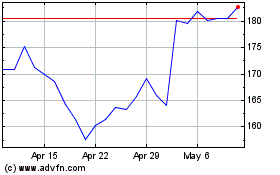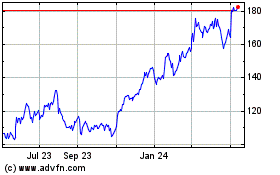The Apple-Qualcomm Courtroom Showdown Kicks Off
17 April 2019 - 1:26AM
Dow Jones News
By Tripp Mickle
SAN DIEGO -- Trial arguments in the legal battle between Apple
Inc. and Qualcomm Inc. were scheduled to begin Tuesday with lawyers
representing the tech companies likely to trade barbs in federal
court over how royalties are collected on innovations in smartphone
technology.
During opening remarks in front of a nine-person jury about 15
miles from Qualcomm headquarters, Apple's lawyers are expected to
portray Qualcomm as a monopolist that has used its patent portfolio
to charge onerous licensing fees of 5% of the sales price of
iPhones sold world-wide, up to $400. They also have said the chip
company blocked Apple for years from using another supplier of
modem chips.
Qualcomm's attorneys are likely to defend its licensing
practices and paint Apple as a bully that is responding to a
slowdown in its core iPhone business by forcing Qualcomm to accept
less money than it deserves for its contributions to the smartphone
era.
Chief Executives Tim Cook and Steve Mollenkopf, of Apple and
Qualcom respectively, are expected to amplify those messages when
they take the stand in the coming weeks, a testament to the chasm
between the companies' competing viewpoints on the value of
smartphone innovations .
At stake is the future of Qualcomm's business. An unfavorable
ruling could force it to overhaul a licensing business that once
accounted for half of its profit.
Meanwhile, Apple's legal challenge has left it without access to
Qualcomm's market-leading 5G modem chips, putting its most
important product, the iPhone, a step behind Android competitors in
the race to the next big advance in wireless.
Billions of dollars in damages are up for grabs. Apple's
contract manufacturers, who paid the disputed royalties under the
Apple-Qualcomm licensing agreement, are seeking $9 billion in
alleged overpayments to Qualcomm -- a sum that could soar to $27
billion under U.S. antitrust law that allows a jury to increase
damages in cases involving anticompetitive behavior.
Qualcomm has countered by seeking $7 billion in royalties those
Apple manufacturers started withholding as the legal battle
commenced more than two years ago. Qualcomm could also argue that
Apple, which it says encouraged the manufacturers to violate their
contractual obligations, should pay a penalty of as much as $14
billion.
Attorneys in the Apple-Qualcomm case must simplify their
clients' complex dispute and make it accessible to jurors
unfamiliar with intellectual property law, said Michael Salzman, an
attorney with Hughes, Hubbard & Reed who specializes in
antitrust law related to intellectual property.
"This is up front and personal between the two parties," Mr.
Salzman said. "The jury is trying to figure out between the two who
has the white hat and who has the black hat."
The two-year feud started as global smartphone sales slowed,
pressuring both their businesses. Apple had paid Qualcomm $7.50 in
royalties on every iPhone it sold since 2007 -- a price the parties
reached with complex agreements that lowered Qualcomm's standard
royalty rate through rebate and incentive payments. Apple also
agreed to make Qualcomm the exclusive provider of modem chips for
iPhones from 2011 to 2016.
Apple added chips from Intel Corp. to some iPhone models in
2016, as its most recent contract with Qualcomm concluded. It then
slapped Qualcomm with a lawsuit in January 2017.
The companies were expected to settle their dispute long before
the trial began. However, they have been so at odds over royalties
that it has been difficult to make headway, people familiar with
the situation said.
Other issues have heightened the distrust. For example, Qualcomm
executives suspected Apple of supporting a hostile takeover bid by
Broadcom Inc., and Apple executives were angered that Qualcomm
hired an opposition-research firm with ties to a news outlet that
published articles calling the iPhone maker Silicon Valley's
biggest bully.
The companies are awaiting a ruling from a federal judge in an
antitrust case brought by the Federal Trade Commission against
Qualcomm that could weaken or strengthen Qualcomm's position -- by
deciding whether Qualcomm's pricing policy for chips stifled
competition.
Write to Tripp Mickle at Tripp.Mickle@wsj.com
(END) Dow Jones Newswires
April 16, 2019 11:11 ET (15:11 GMT)
Copyright (c) 2019 Dow Jones & Company, Inc.
QUALCOMM (NASDAQ:QCOM)
Historical Stock Chart
From Mar 2024 to Apr 2024

QUALCOMM (NASDAQ:QCOM)
Historical Stock Chart
From Apr 2023 to Apr 2024
